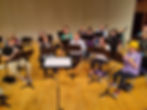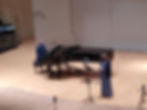
TN Tech is a great place to study the oboe. In addition to your lessons and ensembles, you will grow tremendously by working and collaborating your fellow oboe students, particularly in working on reeds together. I foster a very positive, encouraging environment in my studio, and I expect that you will all be helping each other out and sharing what you have learned with one another so that we can all progress faster together. Join us!
We have two big events planned for this year:
TN Tech hosts its All-Star Instrumental Symposium on Friday, November 3, 2023. Sign up to spend the day on our campus, get help on your All-Region auditions, and play in our Double Reed Ensemble!
Join us on Saturday, April 20, 2024 for our fourth annual TN Tech Double Reed Forum, an all-day double reed experience featuring recitals, workshops, masterclasses, vendors, instrument repair, reed making, and a performance by the TN Tech Double Reed Ensemble! Keep an eye on our registration website for more information. See you there!
Follow the oboe studio on Instagram (@tntech_oboes)!
Summer 2023 update: the oboe studio continues the long-term research project we began in 2021, looking at the relationship between air pressure and loudness during wind instrument performance. Oboe players are invited to come to campus and participate in our project as a research subject; current Tech music students can work with Dr. Adduci to develop and conduct their own experiment! This summer we are investigating the effect of different reed staples on the tone color and air pressure requirements for oboe playing.


Audition requirements for prospective students:
Auditions are in February and March for the following academic year. Get more information and sign up for an audition at tntech.edu/musicscholarships!
In addition to playing scales from memory (all major and minor scales, two octaves to high D), the audition candidate should prepare approximately 10 minutes of music for the audition. Entire pieces are not required - individual movements or excerpts are acceptable. The candidate should prepare a combination of materials that showcase their technical and lyrical abilities. Please contact me if you have any questions about auditions!
Examples of suitable repertoire:
Cimarosa, Concerto for Oboe in C Major
Ferling, 48 Studies for Oboe, Op. 31
Marcello, Concerto for Oboe in C Minor
Mozart, Oboe Quartet in F Major, K. 370
Nielsen, Two Fantasy Pieces
Saint-Saëns, Sonata for Oboe, Op. 166
Telemann, Sonata for Oboe in G Minor







Lunch in Knoxville with our recent graduates: Spencer, Hunter, Cynthia, Olivia, and Addison

Congratulations, Addison!

I'm so proud of all our students for the way they have excelled and overcome the challenges of remote instruction. This outdoor concert was spectacular!

The oboe class from our first ever TN Tech Double Reed Forum!

Brava, Addison!

We made many adjustments during 2020-2021. Teaching under a tent was new for me!

Congrats, Erika!

Our first ever Zoom masterclass!

2020... the year everything was on Zoom. We perservered, we learned, and we still had fun!

Congratulations, Hunter!



